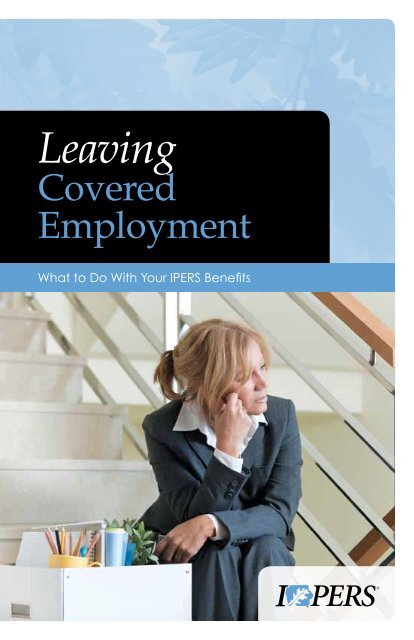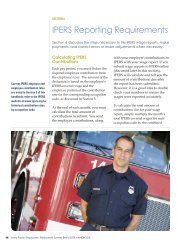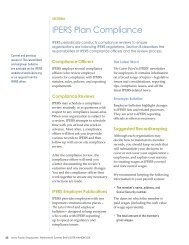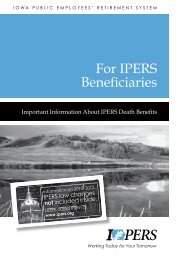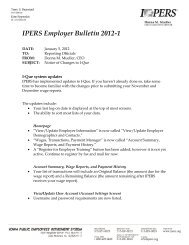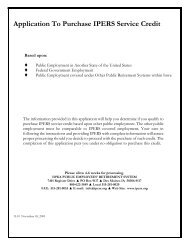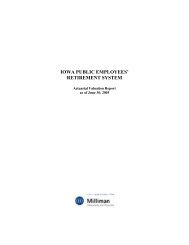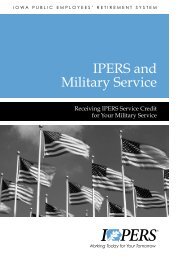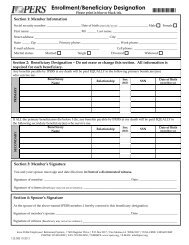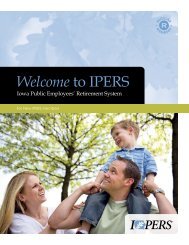Leaving Employment - IPERS
Leaving Employment - IPERS
Leaving Employment - IPERS
Create successful ePaper yourself
Turn your PDF publications into a flip-book with our unique Google optimized e-Paper software.
<strong>Leaving</strong><br />
Covered<br />
<strong>Employment</strong><br />
What to Do With Your <strong>IPERS</strong> Benefits
<strong>Leaving</strong><br />
Covered<br />
<strong>Employment</strong><br />
What to Do With Your <strong>IPERS</strong> Benefits<br />
If you leave <strong>IPERS</strong>-covered employment but you aren’t ready to start<br />
receiving retirement benefits, you can choose from several alternatives<br />
when deciding what to do with your <strong>IPERS</strong> benefits in the meantime.<br />
With <strong>IPERS</strong>, you have the flexibility to make the best decision for you.<br />
This booklet briefly explains certain rights and benefits of <strong>IPERS</strong> membership. It is not a<br />
substitute for federal and state laws governing <strong>IPERS</strong>, which provide complete information<br />
and are subject to change. Although <strong>IPERS</strong> makes every attempt to ensure its materials are<br />
accurate and up to date, any conflict between the contents of the booklet and law must be<br />
resolved in favor of the law. The Member Handbook provides a more detailed description of<br />
<strong>IPERS</strong> benefits. It is available on the <strong>IPERS</strong> website.
About <strong>IPERS</strong> Benefits<br />
<strong>IPERS</strong> was established to help<br />
Iowa public employees have<br />
financially secure retirements.<br />
<strong>IPERS</strong> retirement benefits are<br />
meant to be a portion of your<br />
overall retirement savings.<br />
<strong>IPERS</strong> is a defined benefit pension<br />
plan, which means the retirement<br />
benefits members receive from<br />
<strong>IPERS</strong> are predictable and stable<br />
because they are calculated using<br />
a formula.<br />
Make Sure This Booklet Applies to You<br />
If you change jobs or employers, but<br />
your new job is still <strong>IPERS</strong>-covered<br />
employment, your <strong>IPERS</strong> participation<br />
will continue automatically and you<br />
cannot take your money out of <strong>IPERS</strong> at<br />
this time. Most Iowa public employees are<br />
<strong>IPERS</strong> members.<br />
If you have left an <strong>IPERS</strong>-covered<br />
position but are still working for an<br />
<strong>IPERS</strong>-covered employer, you must<br />
leave your money in <strong>IPERS</strong>. You will be<br />
eligible to take your money out of <strong>IPERS</strong><br />
only after you have left all employment<br />
with an <strong>IPERS</strong>-covered employer.<br />
<strong>IPERS</strong>-covered<br />
employers<br />
include:<br />
• Schools<br />
• State agencies<br />
• Counties<br />
• Cities<br />
• Townships<br />
• Other public<br />
employers<br />
Did you know<br />
One in ten<br />
Iowans is an<br />
<strong>IPERS</strong> member.<br />
What to Do With Your <strong>IPERS</strong> Benefits<br />
3
Your Contributions to <strong>IPERS</strong><br />
You and your employer contribute<br />
to <strong>IPERS</strong> throughout your <strong>IPERS</strong>covered<br />
employment, and once<br />
you leave employment, you are<br />
always entitled to 100 percent<br />
of your own contributions and<br />
interest earnings.<br />
However, when you become a<br />
vested <strong>IPERS</strong> member, you have<br />
a right to more than your own<br />
contributions and interest—you<br />
gain a right to a portion of your<br />
employer’s investment based on<br />
your years of service. Vesting also<br />
entitles you to other rights under<br />
<strong>IPERS</strong>; see the “Vested Members”<br />
booklet for more information.<br />
STARTIng July 1, 2012, you<br />
become vested when<br />
You meet one of these<br />
conditions:<br />
• You complete seven years<br />
of service.<br />
• You reach age 65 while in<br />
<strong>IPERS</strong>-covered employment.<br />
There is a separate set of vesting<br />
rules for Regular members who<br />
vested before July 1, 2012, and all<br />
Special service members (sheriffs,<br />
deputies, and members in the<br />
protection occupations). These<br />
members can vest with four years<br />
of service or at age 55 while in<br />
covered employment.<br />
Not Sure Whether You Are Vested<br />
You can register and log in to My Account at www.ipers.org to see your<br />
personalized benefits statement. Your benefits statement shows how many<br />
years of service you have completed as of the date of the statement. You can<br />
also call or email <strong>IPERS</strong> to find out whether you are a vested member.<br />
4 leaving covered employment
Alternatives When You Leave<br />
<strong>IPERS</strong>-Covered <strong>Employment</strong><br />
If you leave <strong>IPERS</strong>-covered<br />
employment and you are<br />
not eligible—or ready—<br />
to retire, you can:<br />
• Leave your money in <strong>IPERS</strong><br />
until you can start receiving<br />
retirement benefits, return to<br />
<strong>IPERS</strong>-covered employment,<br />
or choose another alternative.<br />
• Roll your money over to<br />
another retirement plan (while<br />
taking a refund from <strong>IPERS</strong>).<br />
• Take a refund.*<br />
*If you worked in <strong>IPERS</strong>-covered employment for less than six months, your former employer<br />
may file a wage adjustment with <strong>IPERS</strong> and return your contributions to you. The employer<br />
may make this decision even if you are a vested member.<br />
What to Do With Your <strong>IPERS</strong> Benefits<br />
5
<strong>Leaving</strong> Your Money in <strong>IPERS</strong><br />
You may leave your money in<br />
<strong>IPERS</strong> until you are ready to:<br />
• Roll your money over to<br />
another retirement plan.<br />
• Take a refund.<br />
• Begin retirement benefits,<br />
if eligible.<br />
If you decide to leave your money<br />
in <strong>IPERS</strong>, it will continue to earn<br />
interest.<br />
What You Need to Do<br />
If you want to leave your money<br />
in <strong>IPERS</strong>, you do not need to<br />
do anything. Your money will<br />
automatically remain in <strong>IPERS</strong>. If<br />
you later decide to roll over your<br />
money to another retirement<br />
plan or take a refund, you can<br />
apply anytime.<br />
Applying for<br />
Retirement Benefits<br />
If you are vested, you may become<br />
eligible for monthly retirement<br />
benefits in the future. If you want<br />
to receive these benefits someday,<br />
keep your money in <strong>IPERS</strong> until<br />
you are eligible and ready to<br />
begin receiving them. Benefits<br />
may begin as early as age 55, or<br />
before age 55 if you are awarded<br />
Social Security disability benefits<br />
or Railroad Retirement benefits.<br />
(Certain sheriffs and deputies may<br />
become eligible earlier.) To apply<br />
for benefits, contact <strong>IPERS</strong>.<br />
If you leave your money in <strong>IPERS</strong>, keep these things in mind:<br />
• Get benefit estimates. If you are<br />
vested, you may contact <strong>IPERS</strong><br />
anytime to request a benefit estimate.<br />
• Keep your address updated with<br />
<strong>IPERS</strong> to ensure you receive<br />
important benefit information.<br />
• Update your <strong>IPERS</strong> beneficiary<br />
designation when necessary.<br />
To change your beneficiary, call<br />
<strong>IPERS</strong> or visit www.ipers.org<br />
for an Enrollment/Beneficiary<br />
Designation form.<br />
6 leaving covered employment
Special Considerations<br />
Each member’s situation is different. While we cannot tell<br />
you what to do with your money if you leave <strong>IPERS</strong>-covered<br />
employment, here are some times when it might make sense to<br />
leave your money in <strong>IPERS</strong>:<br />
• You plan to return to <strong>IPERS</strong>covered<br />
employment in the<br />
future. If you decide to return<br />
to <strong>IPERS</strong>-covered employment,<br />
the service credits you earned<br />
before you left employment will<br />
remain on file if you keep your<br />
money in <strong>IPERS</strong>.<br />
• Your new employer’s retirement<br />
plan has a waiting period before<br />
you are eligible to participate.<br />
Consequently, you cannot roll<br />
your money from <strong>IPERS</strong> into your<br />
new employer’s plan until the<br />
waiting period ends.<br />
• You do not have another<br />
retirement plan to roll your<br />
contributions over to.<br />
• You don’t want to worry about<br />
managing your investment. <strong>IPERS</strong><br />
manages how assets are invested<br />
so you don’t have to worry about<br />
making investment decisions.<br />
• You want to keep access to <strong>IPERS</strong><br />
death and disability benefits.<br />
By leaving your money in <strong>IPERS</strong>,<br />
you continue to provide your<br />
beneficiary with protection if you<br />
die. If you are vested and become<br />
eligible for Social Security<br />
disability or Railroad Retirement<br />
disability benefits, you will<br />
also become eligible for <strong>IPERS</strong><br />
disability benefits if you leave<br />
your money in <strong>IPERS</strong>.<br />
• You aren’t sure what to do.<br />
While you decide, you can leave<br />
your money in <strong>IPERS</strong> and let it<br />
earn interest. If you decide later<br />
that you want to take a refund,<br />
you may apply for it then.<br />
What to Do With Your <strong>IPERS</strong> Benefits<br />
7
Rolling Over Your Refund<br />
Rolling over your <strong>IPERS</strong><br />
money requires you to take a<br />
refund, which ends your <strong>IPERS</strong><br />
membership. Making a rollover<br />
transfers your <strong>IPERS</strong> refund to<br />
another eligible retirement plan.<br />
There are two WAys to<br />
make a rollover:<br />
• Have <strong>IPERS</strong> transfer the<br />
refund money directly to the<br />
other retirement plan (a direct<br />
rollover).<br />
• Send the money to another<br />
retirement plan yourself after<br />
taking the refund from <strong>IPERS</strong>.<br />
If you make a direct rollover, you<br />
can avoid mandatory income tax<br />
withholding, defer income tax<br />
liability, and, if applicable, avoid a<br />
10 percent early-distribution tax.<br />
Consider This Before<br />
Taking Your <strong>IPERS</strong> Refund<br />
<strong>IPERS</strong> provides lifetime, monthly<br />
benefits to vested members whose<br />
monthly benefit is $50 or more.<br />
When you make a rollover or take<br />
a cash refund, you give up your<br />
<strong>IPERS</strong> membership rights for that<br />
period of employment.<br />
If you choose to make a rollover,<br />
it is necessary to withdraw 100<br />
percent of your funds. However,<br />
you do not need to roll over 100<br />
percent. You may choose to roll<br />
over a portion and take the rest<br />
as a cash refund.<br />
You will receive detailed tax<br />
information when you apply for<br />
a rollover or a cash refund. See<br />
page 11 for more information.<br />
<strong>IPERS</strong> will send you an IRS<br />
Form 1099-R in January, the<br />
year following your rollover or<br />
refund. Read more on how to<br />
apply on page 12.<br />
8 leaving covered employment
Eligible Retirement Plans<br />
<strong>IPERS</strong> is a Section 401(a) plan. The following types of retirement<br />
plans accept funds from <strong>IPERS</strong>.<br />
• A traditional IRA (not a SIMPLE<br />
IRA or Coverdell Education<br />
Savings Account, formerly<br />
known as an Education IRA)<br />
• A Roth IRA<br />
• An eligible employer plan,<br />
such as a:<br />
• Section 401(a) plan<br />
• Section 401(k) plan<br />
• Profit-sharing plan<br />
• Defined benefit plan<br />
• Stock bonus plan<br />
• Money purchase plan<br />
• Section 403(a) retirement<br />
plan<br />
• Section 403(b) taxsheltered<br />
annuity<br />
• Section 457(b) plan<br />
maintained by a<br />
governmental employer<br />
If you decide to make a direct<br />
rollover, confirm that the plan<br />
you’re rolling your money over<br />
to is an eligible plan and find out<br />
whom the rollover check should be<br />
made payable to. You must include<br />
this information, and the type of<br />
plan you are rolling your money<br />
into, on your Application for <strong>IPERS</strong><br />
Refund. <strong>IPERS</strong> will send your<br />
rollover check directly to that<br />
institution on your behalf.<br />
What to Do With Your <strong>IPERS</strong> Benefits<br />
9
Taking a Refund Without Rollover<br />
When you take a refund,<br />
you terminate your <strong>IPERS</strong><br />
membership, which could mean<br />
giving up a right to lifetime<br />
monthly benefits and <strong>IPERS</strong><br />
disability and death benefits. If<br />
you receive a refund, you forfeit<br />
all service credits and wage<br />
records. If you later return to<br />
covered employment, you will<br />
be enrolled as a new member<br />
without credit for any service<br />
before the refund.<br />
If you decide to take a refund, you<br />
must withdraw 100 percent of your<br />
available money. You cannot leave<br />
a portion of your money in <strong>IPERS</strong>.<br />
The Refund Value of<br />
Your <strong>IPERS</strong> Account<br />
The refund value of your<br />
<strong>IPERS</strong> account includes your<br />
contributions, any employer<br />
contributions you are entitled to,<br />
and interest earnings. You must<br />
be vested to receive any of your<br />
employer’s contributions.<br />
To calculate how much of your<br />
employer’s contributions and<br />
interest you can receive, divide<br />
your years of service by 30<br />
if you are a Regular member or 22<br />
if you are a Special service member.<br />
If you have more than 30 years of<br />
service (or 22 if you are a Special<br />
service member), you will receive<br />
100 percent of your employer’s<br />
contributions and interest.<br />
Example:<br />
Jenny, a Regular member, has<br />
12 years of service when she<br />
leaves employment. She is<br />
eligible to receive 40 percent<br />
of her employer’s investment<br />
[12 years ÷ 30].<br />
Generally, the only way to<br />
reinstate service covered by a<br />
refund is to return to <strong>IPERS</strong>covered<br />
employment and make<br />
a service purchase called a<br />
“buy-back.” See the “Purchasing<br />
Service” booklet for more<br />
information. Limited exceptions<br />
may apply if you are reinstated<br />
following an employment dispute<br />
or you qualify for Social Security<br />
disability or Railroad Retirement<br />
disability benefits.<br />
10 leaving covered employment
Once you file for a refund, you<br />
cannot work in <strong>IPERS</strong>-covered<br />
employment for 30 days after<br />
leaving employment or your<br />
refund will be revoked. If<br />
you return to <strong>IPERS</strong>-covered<br />
employment before 30 days<br />
have passed, you must pay back<br />
your refund within 30 days of<br />
notification from <strong>IPERS</strong>. After the<br />
30-day period, you must pay the<br />
buy-back cost to restore service<br />
credit for the period covered by<br />
the refund. See how to apply for a<br />
refund on page 12.<br />
About Taxes<br />
Your <strong>IPERS</strong> refund is taxable<br />
income if it is paid directly to<br />
you (instead of being rolled over).<br />
<strong>IPERS</strong> will automatically withhold<br />
20 percent of the taxable portion<br />
for federal income taxes, plus<br />
an additional 5 percent for<br />
state income taxes if you are<br />
an Iowa resident.<br />
In addition to income tax<br />
withholding, you may be<br />
responsible for an additional 10<br />
percent early-withdrawal tax<br />
penalty if you receive your refund<br />
before age 59½. This is in addition<br />
to your regular federal income<br />
taxes and any applicable state<br />
income taxes. However, if you leave<br />
<strong>IPERS</strong>-covered employment after<br />
age 55 (age 50 if you are a Special<br />
service member), the additional 10<br />
percent tax may not apply.<br />
You will receive detailed tax<br />
information when you apply for<br />
a rollover or a cash refund. <strong>IPERS</strong><br />
will send you an IRS Form 1099-R<br />
in January, the year following<br />
your rollover or refund.<br />
Depending on your personal<br />
situation, you may be subject<br />
to additional withholding at<br />
tax time. Your cash refund is<br />
considered taxable income in the<br />
year in which you receive it.<br />
What to Do With Your <strong>IPERS</strong> Benefits<br />
11
Applying for a Rollover<br />
or Cash Refund<br />
Before applying for a rollover<br />
or cash refund, you may want<br />
to contact your tax adviser to<br />
discuss the tax consequences of<br />
your choice. Contact an <strong>IPERS</strong><br />
representative to ensure you<br />
understand how your decision<br />
impacts your <strong>IPERS</strong> membership.<br />
To apply for a rollover or<br />
cash refund:<br />
• Get an Application for <strong>IPERS</strong><br />
Refund by registering for and<br />
logging in to My Account<br />
through www.ipers.org or<br />
calling <strong>IPERS</strong> at 515-281-0020<br />
or toll-free at 1-800-622-3849.<br />
• Complete the application and<br />
return it to <strong>IPERS</strong>.<br />
• <strong>IPERS</strong> will generally issue your<br />
rollover payment or cash refund<br />
within two to three weeks of<br />
receiving of your completed<br />
application. In some situations,<br />
such as a divorce settlement, it<br />
may take longer.<br />
Keep Your Address Up to Date<br />
To make sure you receive<br />
important information<br />
from <strong>IPERS</strong>—including<br />
important tax forms—keep<br />
your home address current<br />
with <strong>IPERS</strong>.<br />
12 leaving covered employment
Automatically Receiving<br />
Your Money<br />
If you leave your money in <strong>IPERS</strong>,<br />
do not make any contributions for<br />
five years, and have an account<br />
balance less than the maximum<br />
set by the IRS ($1,000 in 2012),<br />
<strong>IPERS</strong> will automatically send<br />
you your money and end your<br />
membership. The gross amount of<br />
the payment will consist of your<br />
contributions plus interest and, if<br />
you are vested, a portion of your<br />
employer’s contributions and<br />
interest.<br />
If, in five years, you are eligible<br />
for this payment, <strong>IPERS</strong> will<br />
notify you by mail that you will<br />
receive it soon.<br />
If you receive the NOTICE<br />
from <strong>IPERS</strong>, you may:<br />
• Do nothing. You will soon<br />
receive your payment. You may<br />
keep the payment or roll it over<br />
to an eligible retirement plan. If<br />
you are under age 59½, you may<br />
be subject to early-withdrawal<br />
tax penalties. The penalties may<br />
not apply if you left employment<br />
after age 55 (age 50 if you are a<br />
Special service member).<br />
• Restore your <strong>IPERS</strong> account by<br />
following the instructions on the<br />
letter within 30 days.<br />
• Have <strong>IPERS</strong> make a direct<br />
rollover of your money to an<br />
eligible retirement plan by<br />
following the instructions on the<br />
letter within 30 days.<br />
For more information about<br />
restoring your account or rolling<br />
over an automatic payment,<br />
contact <strong>IPERS</strong>. If you have an<br />
account balance less than the<br />
IRS maximum and <strong>IPERS</strong> cannot<br />
locate you, your account will stop<br />
earning interest.<br />
What to Do With Your <strong>IPERS</strong> Benefits<br />
13
Notes<br />
14 leaving covered employment
What to Do With Your <strong>IPERS</strong> Benefits<br />
15
Questions Contact us.<br />
www.ipers.org<br />
info@ipers.org<br />
515-281-0020<br />
1-800-622-3849 (toll-free)<br />
7:30 a.m.–5 p.m. Central Time<br />
Monday–Friday<br />
Fax: 515-281-0053<br />
Mailing Address<br />
Iowa Public Employees’<br />
Retirement System<br />
P.O. Box 9117<br />
Des Moines, IA 50306-9117<br />
Office Hours<br />
8 a.m.– 4:30 p.m. Central Time<br />
Monday – Friday<br />
7401 Register Drive<br />
Des Moines, IA 50321<br />
Alternative formats of this publication are available on request.<br />
470.004 06/12<br />
©2012 Iowa Public Employees’ Retirement System


